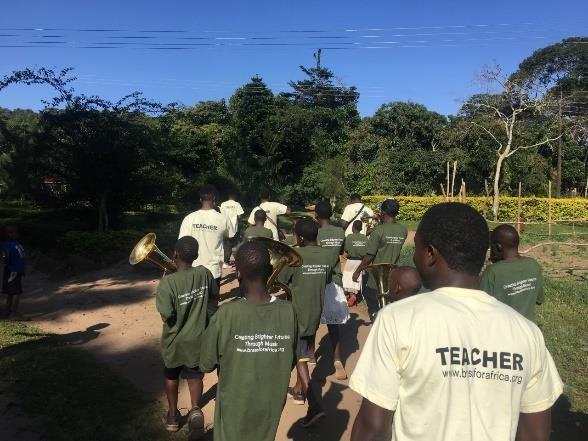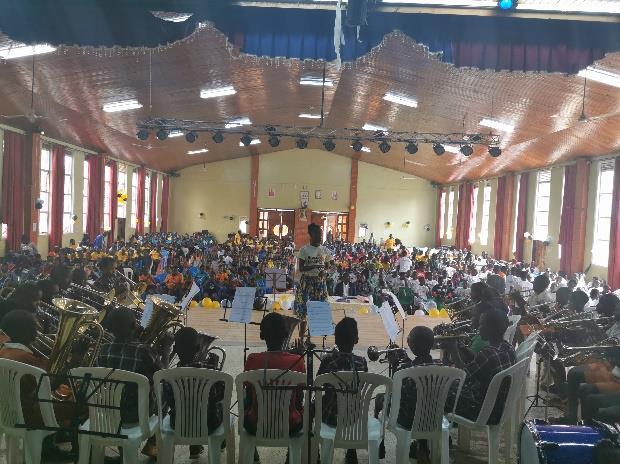
5 minute read
Brass For Africa (Alumni Host, Queen’s College
Lasting Impressions
It's hard to put into words the impact this has made on me, and I think I'll be working through it
and discovering new changes in me long into the future. It's challenged me and brought me
face to face with both an alien culture, and some of the big ethical problems of the world and
my place in it. But more than that it's brought me into contact with an incredible group of
people, who have taught me so much. Being surrounded by people who are older and have
done so much more in their life is just an amazing experience, which has informed my vision for
my future loads.
Practical Advice
Take risks, apply for terrifying challenges, genuinely what's the worst that could happen? You
definitely don't have to be thinking about your career to apply to these things, if you just find
something that interests you as a person, that fascinates you in its existence, then engage with
it and everything will come later! And then once you've got one of these opportunities, which
many people could only dream of having, work at it with your entire effort, and engage with
every facet of the experience. Just make the most of what you're given.
Charlotte Grayson, Wadham College, BA Philosophy, Politics and Economics, Final
Year Undergraduate, in-person working
Work Projects
My project was to work on improving the methods
used by the charity to monitor and assess the life skills
of its beneficiaries (children and young people). Brass
for Africa’s life skills curriculum focuses on eight key attributes: self-confidence, resilience, communication,
leadership, teamwork skills, problem-solving,
concentration, and grit and perseverance. I looked at previously used surveys and considered
their strengths and weaknesses. During my first couple of weeks in Uganda, I visited many of
the outreaches so that I got a feel for the different types of places where Brass for Africa
operates. This was very useful – I recognised that there were many challenges with designing
good tools for my project. I then spent most of my time in the office researching tools that I
might be able to adapt for use by the organisation. At the end of my time in Uganda, I gave a
presentation to all the staff with my recommendations – I had selected some existing tools and
created some of my own; focusing on only some of the key attributes. The host organisation
ensured I was able to visit many of the outreaches and provided me with a desk. I was able to
talk to the staff to ask about questions.
Daily Life
Everyone was very welcoming and tried to be as
helpful as possible – I had a huge welcome party at
the airport! I had a very good-sized apartment to
myself. This was in a gated compound, a 5-minute
walk from the office which was convenient.
Unsurprisingly the local diet is very different to what I’m used to. Eventually I settled into a good routine of having a ‘rolex’ in the morning (chapati with fried egg on top and then rolled – rolled eggs) and a rotation of lunch options at the

restaurant we all ate at. Indeed, my lunch order ended up being my only regular use of Luganda
(the most widely spoken language in this region of Uganda). I often had quite quiet evenings to
myself after work and tended to listen to podcasts and call my family. I socialised with other
staff – especially with another intern who was from Uganda who worked in the same office as
me. She took me to the city centre (roughly a 20 minute motorbike ride away) to see the
markets and was really helpful with explaining and translating things for me.
At the weekends, I took the opportunity to do some sightseeing. I visited the Uganda National
Mosque, the Kabaka’s Palace and the zoo. Visiting these places made me very familiar with the
local modes of transport – motorbikes taking passengers known as boda-bodas for smaller
journeys and passenger-carrying minibuses (taxis) for longer journeys. My longest taxi journey
was to Uganda’s second largest city Jinja. It is a far calmer, smaller city than Kampala and is near the source of the Nile. With some of my colleagues I also visited restaurants, the cinema
and a bar with live music.
Lasting Impressions
I really enjoyed the experience. It was a very different place to anywhere I have been before
and I am glad that I was there for enough time to get a bit used to the way of life. I gained a lot
and learned a great deal about NGOs. It was really special to be surrounded by people from
such diverse backgrounds all passionate about making the lives of children and young people
better. Seeing first hand the difference Brass for Africa is making to communities and
individuals was really great. The experience has informed the direction of my studied – I am
now taking courses in development and global health as a result. I am also more inclined to
consider working for an NGO in the future, this has been really helpful in showing me what I am
interested in. It has also given me a lot to think about with regard to where I want to work in the future/where I want the organisations I work for in the future to be active. I am still very
much considering the options on this front.
Practical Advice
I wholeheartedly recommend undertaking an
internship in Brass for Africa. Go in with an open mind
and be ready to try new things. Certain things will
likely take a bit of getting used to but don’t be afraid to ask people for help or explanations. If you can, try to learn some phrases in Luganda before you go (I didn’t and wish I’d been a bit more proactive on this front). Even if you aren’t there for a music-based internship, ask some of the teachers to

help you try out a brass instrument!










